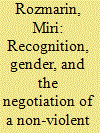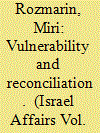| Srl | Item |
| 1 |
ID:
110032


|
|
|
|
|
| Publication |
2012.
|
| Summary/Abstract |
This article examines two factors, recognition and gender, which, it is argued, need to be integrated with the MOP (Mind of Peace) model. The first section of the paper elaborates on the demand for recognition as both intersubjective and collective demand. It employs examples from one of the experiments, which took place in Beit Jala, in order to suggest how the MOP experiment might deal with these two facets of recognition. The second section of the article argues that a gendered perspective could contribute to the success of the MOP experiment. By implementing the logic of the 1325 UN Security Council resolution, and feminist scholarship, it suggests what such a gendered perspective might mean for the MOP experiment.
|
|
|
|
|
|
|
|
|
|
|
|
|
|
|
|
| 2 |
ID:
153236


|
|
|
|
|
| Summary/Abstract |
This article argues that mapping vulnerabilities of both sides in conflicts is essential for building sustainable processes of transformation aimed towards reconciliation. This mapping should be attentive to two kinds of vulnerability – contextual and ontological; the former designates social wrongs, and the latter stands for a basic aspect of human lives. The first part of the article discusses the difference between ontological and contextual vulnerability. The second part addresses the question of how acknowledging vulnerability may influence politics. The third part elaborates on how addressing vulnerability might operate as part of reconciliation processes. The final part argues that the Minds of Peace (MOPE) Experiment, as a simulation of a Palestinian‒Israeli public peacemaking assembly, should include special attention to vulnerability. It then suggests some practical measures that could be integrated into the MOPE experiment in order to engage with the aspect of vulnerability.
|
|
|
|
|
|
|
|
|
|
|
|
|
|
|
|